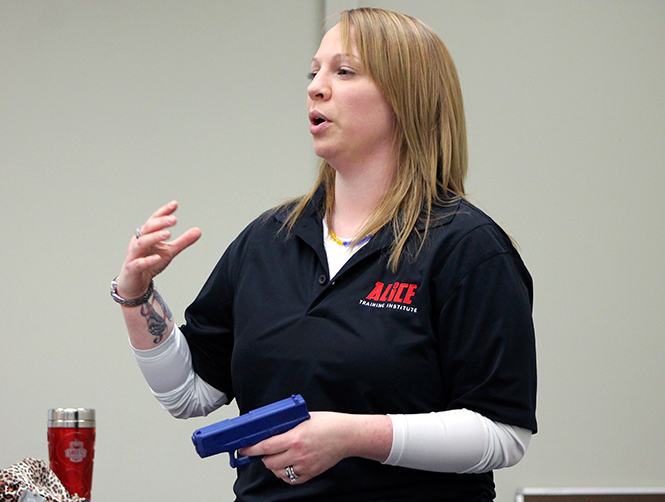Kent State provides safety training for freshmen
September 1, 2015
Kent State’s Office of Student Success Programs has taken a three-pronged approach to teaching safety to incoming freshmen. This includes a safety session at Destination Kent State, residence hall meetings during Welcome Weekend and a required ALICE training during the First Year Experience course.
During the 25 DKS sessions this summer, the university police department presented safety sessions for the thousands of incoming freshmen. The safety sessions were an hour long and included presentations from the Women’s Center, University Health Services, the Office of Student Conduct, Police Services and the Office of Sexual and Relationship Violence Support Services, or SRVSS.
“I really don’t know how we could have made it bigger,” said Community Resource Officer Tricia Knoles. “We hit every freshman coming in.”
The campus police department will also give A.L.I.C.E. training in FYE classes. A.L.I.C.E. stands for Alert, Lockdown, Information, Counter and Evacuation. It is designed to teach students what to do in case of an active shooter on campus.
Knoles said more optional safety presentations will be given throughout the semester, especially in the dorms.
Community police officers will be placed in each dorm in preparation for Halloween.
“They will walk through the halls, give alcohol presentations, party safety presentations — every dorm usually takes advantage of it,” Knoles said.
Joshua Perkins, assistant director of Student Success Programs, said it was important for students to receive multiple levels of safety training throughout the year.
“I don’t think you can err on the side of being too safe,” Perkins said. “I do think you have to be mindful of the audience and what’s connecting with them and how to best reach them.”
During peak times, like Halloween, many FYE classes will be talking about the effects of alcohol and how it alters the decision making process, he said.
Perkins said many incoming freshmen don’t know what being safe on campus means, which is why students are given the chance to attend so many safety sessions. Students are taught basic safety techniques, including locking doors, walking in groups at night, keeping track of belongings and calling the police department when there is suspicion of criminal activity.
Since the beginning of the semester on Monday, there have been three arrests for underage drinking, two arrests for intoxication creating risk of harm and three suspected thefts, according to the Kent State University Police Services Daily Report Log.
Contact Hannah Armenta at [email protected].

























